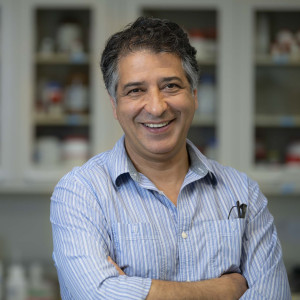Mohamed Trebak

From
University of Pittsburgh School of Medicine - USA
In residence at
Nutrition, Cancer & Oxidative metabolism (N2COX) / INSERM, University of Tours - FR
Host scientist
Dr Marie Potier-Cartereau
BIOGRAPHY
Dr. Mohamed Trebak is an internationally recognized leader in the study of vascular smooth muscle, calcium signaling and ion channels. He received his Msc. and PhD in Biochemistry from The University Liege, Belgium. He completed Postdoctoral studies at the Wistar Institute of Philadelphia and at the National Institute of Environmental Health Sciences (NIH/ NIEHS) in Research Triangle Park, NC. He was recruited to Albany Medical College in 2007 and promoted to associate professor in 2010 and to full professor in 2015. Dr. Trebak is currently a tenured professor in the department of pharmacology and chemical biology at the University of Pittsburgh School of Medicine.
Dr. Trebak’s work has been recognized by the NIH with over twenty years of continuous funding, and an NIH Outstanding Investigator Award from the Heart Lung and Blood Institute (NHLBI). He served and continue to serve on Editorial Boards for eLife, Journal of Biological Chemistry, Cell Calcium, Physiological Reviews and Annual Reviews of Physiology. Dr. Trebak has produced over 170 publications in high quality, peer reviewed journals, and mentored fifty graduate students, postdocs and research faculty members.
PROJECT
Interorganellar calcium signaling in colorectal cancer
Colorectal cancer (CRC) is a leading cause of death. Despite advancements in detection and treatment, patients diagnosed with metastatic CRC have poor prognoses. Cytosolic, endoplasmic reticulum (ER) and mitochondrial Ca2+ are interconnected and are fueled and regulated through Ca2+ influx across the plasma membrane (PM). The most ubiquitous pathway of regulated Ca2+ entry across the PM in store-operated Ca2+ entry (SOCE) regulated by ER-resident STIM1 and STIM2 proteins. These Ca2+ signaling mechanisms are crucial for cell function and are disrupted in disease, including cancer. We reported recently that STIM2 expression is decreased in a significant cohort of colorectal patients. Loss of STIM2 is associated with poor colorectal cancer patient survival. We revealed a novel SOCE-independent function of STIM2 in regulating ER and mitochondrial Ca2+ homeostasis and the unfolded protein response (UPR)-dependent ER stress response in CRC. Loss of STIM2 alters ER Ca2+ levels through increase in SERCA2, leading to the activation of cMyc and PERK/ATF4 ER stress signaling to cause transcriptional reprogramming, mitochondrial remodeling, and metabolic rewiring of colorectal cancer cells to support growth and metastasis. Our hypothesis is that the loss of STIM2 triggers enhances ER free Ca2+ and upregulates ATF4 and SERCA2 with onset of ATF-mediated ER stress signaling, and enhanced Ca2+ transfer from ER to mitochondria, leading to metabolic rewiring and CRC metastasis. Our aims are: 1) Determine the specific interactome of STIM2 and whether unique STIM2 interactors are required for ATF4 signaling, SERCA2 expression, ER and mitochondrial Ca2+ signaling in CRC cells. 2) Determine the requirement of STIM2 N-terminus in driving ATF4-dependent signaling and CRC growth and metastasis. 3) Determine the role of SERCA2 and ATF4 in mediating ER and mitochondrial Ca2+ rewiring, mitochondrial function, and transcriptional and metabolic remodeling of CRC. These experiments will shed light on the molecular mechanisms of CRC, will establish STIM2, ATF4 and SERCA2 as potential targets for colorectal cancer and will identify novel interacting proteins of STIM2 as novel CRC targets.

